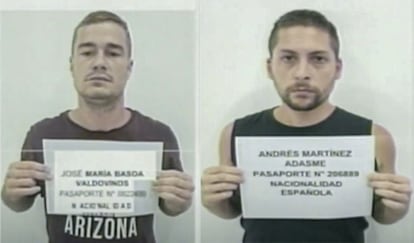Maduro accuses two Spaniards detained in Venezuela of being ‘terrorists’ without providing evidence
The families of José María Basoa and Andrés Martínez Adasme say the men were visiting as tourists. Diplomatic tension between Madrid and Caracas is at a high following the contentious presidential election

Venezuelan President Nicolás Maduro on Monday accused José María Basoa and Andrés Martínez Adasme, two Spanish citizens arrested by Venezuelan authorities, of being “terrorists” without presenting any evidence to back up the claim. He insisted on linking them to Spain’s National Intelligence Centre (CNI), a claim that the Spanish government has categorically denied.
During the broadcast of his television program, Con Maduro +, the president delved into the diplomatic tension between Caracas and Madrid, asserted that the two detainees “are undercover agents” for Spain, and rejected the versions offered by the men’s families, who a week ago reported their disappearance and assured that both had entered Venezuela as tourists on August 17.
The Maduro government’s accusations come amid a crisis between Spain and Venezuela that intensified shortly after the Venezuelan presidential election on July 28. First, there was pressure from numerous international bodies to force Maduro to produce the vote tallies and prove his claim that he was the most voted candidate. Then came the confrontation with the opposition candidate, Edmundo González Urrutia, whose team released online data supporting his own claim to victory at the polls. In this context, Maduro entrenched himself and decided to launch an offensive against Spain after González Urrutia went into exile in Madrid as a political refugee.
The announcement by Spain’s lower house of parliament calling for the recognition of González Urrutia as Venezuela’s president-elect, and statements by the Spanish Minister of Defense, Margarita Robles, who described the Maduro administration as a “dictatorship,” triggered an immediate reaction. The president of Venezuela’s National Assembly and Maduro’s right-hand man, Jorge Rodríguez, proposed that the executive expel large Spanish companies from the country, a threat that received no public response and which for the moment seems to have been put on hold.
Meanwhile the foreign minister, Yván Gil, recalled the Venezuelan ambassador in Madrid and last Friday he also summoned the Spanish representative in Caracas, a common move during diplomatic crises. Then, on Saturday, Diosdado Cabello, one of the most hardline figures of Chavismo, announced the arrests of two Spaniards near Puerto Ayacucho, in the south of the country, linked them to the Spanish intelligence services and implicated them in a crazy plot against the president.
Maduro had Cabello as a guest on his television show. The newly appointed Minister of Interior and Justice was the person in charge of the police operation that led to the capture of Adasme and Basoa. Cabello said that they were intercepted in an “irregular situation,” taking photographs near the local airport. And he broadened the focus of the accusations by pointing to the Joe Biden Administration and stating that Spanish intelligence “depends on the CIA.”
Cabello recalled that there are five people arrested in total, two Americans, one Czech citizen and the two Spaniards. They, together with “mercenaries of French origin,” are all allegedly involved in a plot to “assassinate President Nicolás Maduro.” Cabello also showed Maduro part of a large arsenal of weapons, including machine guns, that were allegedly seized in the operation. There were 400 weapons in total, according to the police. All were shown to the press.
The Spanish government has categorically denied “any suggestion” that it is involved in a plot to politically destabilize Venezuela and has demanded proof of its accusations against its citizens. Sources from the Spanish Foreign Ministry say that they are in touch with the families of the two detainees. The Spanish Embassy in Caracas has reported, for its part, that it is in permanent contact with local authorities, “and has informed them that it will provide diplomatic and consular protection for its nationals.”
Sign up for our weekly newsletter to get more English-language news coverage from EL PAÍS USA Edition
Tu suscripción se está usando en otro dispositivo
¿Quieres añadir otro usuario a tu suscripción?
Si continúas leyendo en este dispositivo, no se podrá leer en el otro.
FlechaTu suscripción se está usando en otro dispositivo y solo puedes acceder a EL PAÍS desde un dispositivo a la vez.
Si quieres compartir tu cuenta, cambia tu suscripción a la modalidad Premium, así podrás añadir otro usuario. Cada uno accederá con su propia cuenta de email, lo que os permitirá personalizar vuestra experiencia en EL PAÍS.
¿Tienes una suscripción de empresa? Accede aquí para contratar más cuentas.
En el caso de no saber quién está usando tu cuenta, te recomendamos cambiar tu contraseña aquí.
Si decides continuar compartiendo tu cuenta, este mensaje se mostrará en tu dispositivo y en el de la otra persona que está usando tu cuenta de forma indefinida, afectando a tu experiencia de lectura. Puedes consultar aquí los términos y condiciones de la suscripción digital.








































